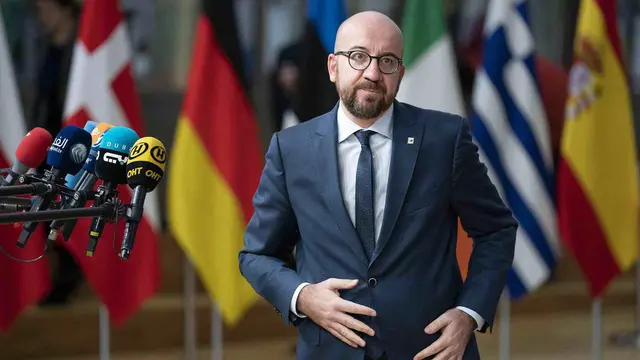Russia has accused Washington of pressuring nations to carry out a mass expulsion of its diplomats in response to a nerve agent attack in the UK.
Foreign Minister Sergei Lavrov accused the US of "colossal blackmail" and said there were "few independent countries" left in modern Europe.
The expulsion of 140 Russians by 25 nations is thought to be the largest in history.
Russian ex-spy Sergei Skripal and his daughter were poisoned on 4 March.
Investigators believe a military-grade nerve agent was used.
EU leaders agreed with the UK last week that it was highly likely Russia was behind the poisoning in Salisbury, southern England. Russia has denied any involvement.
What is Russia's response?
Mr Lavrov said it was inevitable that there would be a response to the mass expulsion. "Certainly, we will not tolerate such impudence," he said.
He singled out the US for blame.
"When one or two diplomats are being expelled from this or that country, all the while whispering apologies in our ear, we know for sure that this is a result of colossal pressure, colossal blackmail, which unfortunately is Washington's main tool now on the international area," he said.
"It is hard to escape a conclusion that we were right when we stressed several times that there remain few independent countries in the modern world, modern Europe."
Russia's foreign ministry is said to be drawing up a number of possible retaliatory measures for President Vladimir Putin to consider.
One Russian senator, Vladimir Dzhabarov, was quoted as saying there would be a "tit-for-tat" response to the US decision to expel 48 envoys at the Russian embassy in Washington and 12 more at the UN in New York.
Russia's embassy in the US tweeted its response to the closure of the Russian consulate in Seattle.
Mr Lavrov's deputy, Sergei Ryabkov, earlier said a tough response was needed but stressed Moscow would not abandon strategic stability talks with Washington.
A new cold war?
"It goes without saying that this unfriendly move… will not go unnoticed," the Russian foreign ministry said on Monday.
"And we will respond to it."
And what form might that take? The Kremlin spokesman, Dmitry Peskov, gave a pretty clear indication.
"Of course, as before, we will be guided by the principle of reciprocity," he said.
So the stage is set for another round - or rounds - of tit-for-tat expulsions. I would assume that scores of Western diplomats will soon be told to pack their bags.
The largest single contingent will, of course, be American. Since this affair is no longer a bilateral matter between Russia and the UK, politicians and commentators here in Moscow are starting to focus their ire on their principal Cold War opponent: Washington.
Indeed, "a new cold war" is a phrase that is now being widely used here.
Who is expelling diplomats?
Ireland has become the latest country to order out a Russian diplomat, saying the attack in Salisbury was "an affront to the international rules-based system on which we all depend for our security and wellbeing".
Earlier, Australia said it was throwing out two Russian diplomats suspected of being "undeclared intelligence officers".
PM Malcolm Turnbull cited interference in elections and threats to "the sovereignty of our partners" for the move, and said "the brazen attack in Salisbury was an attack on all of us".
A total of 25 nations have now announced the expulsion of Russian diplomats.
President of the European Council Donald Tusk said the EU states had decided to take action after a meeting, held last week, about the Salisbury poisoning. He did not rule out further measures.
The US state department said in a statement the attack "on our ally, the United Kingdom put countless innocent lives at risk" and was an "outrageous violation of the Chemical Weapons Convention and breach of international law".
The UK announced it was expelling 23 Russian diplomats earlier this month.
Iceland has also announced it is suspending high-level dialogue with Russian authorities, and its leaders will not attend the World Cup, which starts in Russia in June.
The UK said earlier this month it would not send ministers or members of the Royal Family to the football tournament.
Australia's Foreign Minister Julie Bishop mooted the possibility of boycotting the World Cup altogether.
UK Foreign Secretary Boris Johnson has praised the "extraordinary international response" by the UK's allies. He said "the world has had enough" of Russia's behaviour but rejected suggestions a new Cold War was dawning.
Who is not expelling Russians?
EU countries that have said they have no intention of expelling diplomats include Austria, Greece and Portugal, although all have said they support the UK and condemn the poisoning.
Austria's Chancellor Sebastian Kurz tweeted that while he backed the EU, "as a neutral country we will not expel any diplomats", preferring to "act as a bridge-builder between East and West".
Belgium said that, for now, it was not expelling any diplomats. Prime Minister Charles Michel said Belgium was the headquarters for the EU and Nato and as it hosted Russian ambassadors for both organisations "for that reason we have to consider the possible repercussions extra carefully".
New Zealand's Prime Minister Jacinda Ardern said it did not have any undeclared Russian intelligence officers, but added: "If we did, we would expel them."
(BBC)
 简体中文
简体中文

